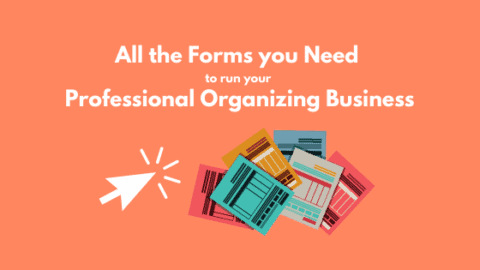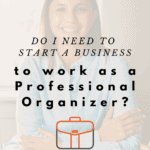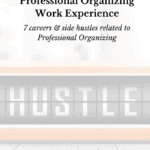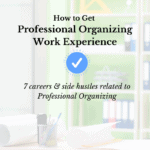… even if you are too inexperienced to start a business
Few things are more empowering than being your own boss. For me, it means never dealing with workplace sexual harassment, wage inequality, or the glass ceiling. For you, it may be something different like more flexibility in your schedule or a creative outlet for your voice to be heard.
But what if you are not quite ready to start a business?
A question that popped up a lot in the comments of my YouTube channel is: “Can I be a Professional Organizer without starting a business?” or folks just feeling like they are too young or inexperienced to start a business on their own. And I feel like such the bearer of bad news when I explain that most Professional Organizers are solopreneurs and that there may not be a lot of companies in your market hiring organizing assistants. This is especially true if you live in a small town or a country where there are not a lot of large, established companies providing team organizing services.
But do not despair! I still want you to be inspired to organize for a living.
Here I’ve listed several related personal service businesses that you can work on the side while you are establishing your professional organizing resume, or that you can work full time while you are building your own business on the side.
Hi! I’m professional organizer and Certified KonMari Consultant Katherine Lawrence. I help you live a life with less clutter so you can have space for the things that truly matter. I teach new and aspiring organizers in my school, Online Bootcamp for Organizing Bosses.
I have identified seven related jobs to professional organizing that you can work as an employee for someone else as you build your professional organizing resumé. You’ll see that these jobs involve a wide range of skills from project management to design to just using brute strength.
These jobs allow you to earn income while you are gaining experience to start your dream career.
So, let’s get started.
Custom Closet Sales and Design
Let’s take a look at our first job and that is working as a sales consultant or designer for a custom closet company. These companies may be franchises or locally-owned individual businesses with contractors and employees who meet with clients in their homes to design closets.
The big distinction between a professional organizer and a closet design company is that the design company is going to install shelving, but they do not typically sort through the belongings of the client. The design company will go into the client’s home, talk about their organizational needs, and take measurements. They will ask the client to remove everything from the closet before the installers arrive and then it’s up to the client to put items back into that space. So the services are quite different but the challenge from the client may be the same. Working on staff with a closet design and install company will give you insight from the client’s perspective and design skills that you could later use in your own organizing business. You could be an employee of a closet company while working your professional organizing business as a side hustle or vice versa.
Hauling Companies
How about working for a hauling company? Now your first thought when planning to become a professional organizer may not have been working as a junk hauler, and you may not physically be able to work in this field as an employee but there may also be office jobs with these companies.
If you plan on having a large-scale decluttering business or specializing in whole-home downsizing, you may be contacted by the same type of clients that would use a hauling service, and hauling companies need to consider eco-friendly ways to dispose of items and be familiar with local disposal laws. They also have to understand the logistics of removing bulky items or large quantities of things from their client’s homes.
The difference between working as a professional organizer and working as a hauler is that a professional organizer is more involved in assisting the client through the decision-making process. However, the crossover skill is that professional organizers specializing in whole home downsizing and haulers are both in the business of removing lots of items from clients’ homes and finding a place for those things to go.

Staging or Interior Design Assistant
Next on the list we have Staging or Interior Design Assistant. There is a bit of crossover between the staging and interior design industry and professional organizing. You will often see professional organizers who specialize in staging or offer some interior design services.
Both professional organizers and stagers work in a client’s home to transform the space and improve the quality of life for people in that home. There may be some overlap between the two industries such as space planning, creating floor plans, and purchasing storage. While professional organizers may deal more with the emotional connections people have with things and also small details like photos, the contents of junk drawers, paperwork, and the like. Both industries work one-on-one with clients to create solutions.
You may find in the area where you live there are more job opportunities to work with an interior designer, decorator, or stager than job opportunities to work as a professional organizer. So be sure to network within these industries and be on the lookout for positions as well while you are building your professional organizing credentials.
Senior Move Managers
Okay let’s take a look at senior move managers. I honestly did not know that this was its own industry until after I became a professional organizer. These companies are all-in-one businesses that transition seniors from their homes to smaller homes or assisted living facilities. They work in teams and need a staff to help seniors make this transition. They are project managers looking at all the facets of senior moving. So they may offer decluttering services, hauling and moving services, as well as space planning and purchasing storage solutions. So you can see how working with a senior move manager would give you a lot of experience with many of the skills that you will use as a professional organizer especially if you plan to have relocation services as your niche.
Estate Agents
How about working for an estate agent? I think in some markets real estate agents and estate agents may be similar industries, but what I’m referring to here are the people who facilitate big home downsizing projects by selling household items. We have several auction companies where I live, and they may also work with real estate agents to get all the possessions out of a home before the house is sold. They also assist family members and clear out estates after someone has passed away.
Similar to hauling companies they are in the business of eliminating large quantities of clutter from someone’s home, but their means of disposal are typically sorting items into categories and then selling them online. They need project management skills. They work on a deadline. People on their team are responsible for sorting and categorizing all the belongings in a home. You can see where there are some crossover skills with professional organizing.

Office Assistant or Office Manager
Let’s take a look at working as an office assistant or office manager. My very first job straight out of college was working as the administrator for a small nonprofit. Little did I know before taking the job that there had not been a full-time staff person working in the office for many months.
The storeroom was an absolute mess. There were stacks of papers everywhere and they were just now getting a computer. I know, that sounds crazy, but it was 1995. I absolutely loved this job. I created a file system, reorganized the storeroom, and created databases on that new computer to keep all the volunteer and event information organized. I eventually outgrew the role and wanted to make more money, so I moved on to data analyst jobs with big corporations. But a spark was ignited. I knew I loved to organize!
Working as an office assistant or manager will hone your skills as an organizer of paper, information, people, and inventory. Start your organizing business as a side hustle or work part-time in an office environment while you get training as a professional organizer.
The Container Store
How about a job at The Container Store? Okay, I just had to mention The Container Store because it’s certainly a fan favorite of mine and I’ve always been so upset that there is not a Container Store within a hundred miles of where I live. When I was starting out as a professional organizer, I would have absolutely loved to work part-time at The Container Store and talk to people about storage solutions. They also offer design services for home offices, closets, pantries, and more using Elfa products. I’ve installed wall hanging closet systems in every house I’ve lived in and I could surely have done that professionally by working as one of their installers or designers if I had not set up my service business when I did.
So there you have it. There are lots of ways to build your confidence and sharpen your organizing skills or to get income while you are training to become a professional organizer.
If you are looking for training that will give you the confidence to start taking clients faster, please check out my Introduction to Professional Organizing course. I put a link to that course in the description of this video.
And remember, these businesses may become a referral source for your business in the future. Just be mindful not to solicit their clients without permission and focus on learning new skills for your future profession as an organizer.
Remember, even Marie Kondo started her organizing services as a side hustle, and I had side jobs while I was building up my clientele.
You can do this!!!








![Organized Living: Solutions and Inspiration for Your Home [A Home Organization Book]](https://m.media-amazon.com/images/I/41YV91X2muL._SL160_.jpg)




